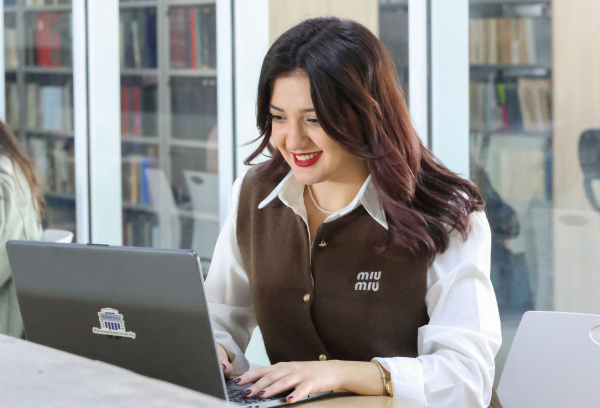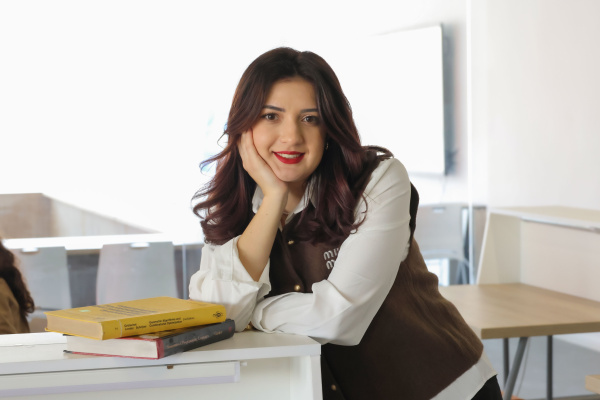February 12, 2025 | 12:20
Educational programs
Education
International cooperation
YSU student shares her experience in multicultural environment and innovative methods
Lilit Sahakyan, a fourth-year student in the "Public Administration" bachelor’s program at YSU Faculty of International Relations, recently returned to Yerevan after spending a semester at Ludwigshafen University of Business and Society in Germany. During her time there, she studied subjects like Marketing and Human Resource Management, among others. Lilit focused on comparing management approaches in the public sectors of Germany and Armenia, and the findings from this research will be included in her final thesis.

Lilit Sahakyan shared insights on the effectiveness of the teaching methods applied at Ludwigshafen University of Business and Society in Germany, as well as the importance of intercultural communication.
Mastering Topics Through Effective Teaching Methods Abroad
In Germany, I greatly appreciated the informal teaching methods. Each day began with a theoretical introduction to the topic, followed by practical assignments related to it. We worked in teams and presented our results to the lecturer. This collaborative approach allowed us to quickly identify each other’s strengths, exchange diverse ideas, and develop solutions together. Whenever questions arose, we could turn to the lecturer for clarification. This method enabled us to master the day’s topic in real-time, as we applied the theoretical knowledge right away. I found this approach to be more effective than simply listening to a 90-minute lecture.
Teamwork was a mandatory component in many of the subjects, and it was the primary method of teaching.
As for the lecturers, I must say that the professors at Ludwigshafen University of Business and Society are experts in their fields. At YSU, in addition to their professional expertise, the professors also possess deep knowledge in other areas.
I continue to stay in touch with several professors from both universities. I can always reach out to them with questions and receive useful answers.

Classes Without Breaks
At YSU, students attend classes five days a week, with 4-5 class sessions each day. In contrast, at Ludwigshafen University of Business and Society, there were days when I had no classes at all, and on other days, we only had one class. Typically, each subject had one 90-minute session per week, conducted without breaks. The classes for my chosen subjects were either held in auditoriums or delivered remotely.
One particularly interesting course was "Case Studies and Business Projects". On the first day, we simply met the lecturer, formed teams, and selected the organization we would work with. After that, we worked in teams for two months, meeting among ourselves without the lecturer's presence. Each team member completed their assigned tasks and prepared progress reports. The second meeting with the lecturer took place during the last class, where we presented our reports on the work done over the two months.
Multicultural Environment and New Discoveries
The students at Ludwigshafen University of Business and Society represented various nationalities, including Japanese, Romanian, Korean, Chinese, and Turkish. I often interacted with students from different nations, exploring the positive aspects of other cultures that we might not have, and vice versa. This multicultural environment helped me become more tolerant, empathetic, and, most importantly, adopt an equal approach to others, regardless of their skin color, nationality, or religion.
At YSU, I had learned negotiation skills with representatives from diverse cultures and studied topics like Japanese eating habits and how Europeans approach discussions on various issues. These skills became much more practical and relevant as I started engaging with people from different backgrounds. I believe that my experience communicating with individuals from various cultures will be useful when I work in any international organization.

Steps Leading to Studying in Germany
To study abroad, factors such as academic progress, proficiency in English (including speaking skills), motivation, and participation in the Erasmus+ program were important.
The six months I spent in Germany were a time of constant comparison between the two universities and the two countries. When it came to student life, I felt like a researcher in Germany. I would go to the university, focus on my subjects, and then return home. In contrast, at YSU, student life and interpersonal relationships were so warm, even outside of class, that despite studying at one of Europe’s leading universities, I found myself missing both Yerevan and YSU.

